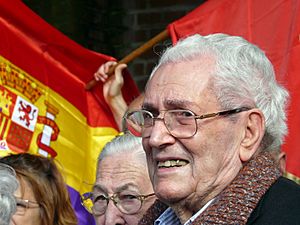Marcelino Camacho facts for kids
Quick facts for kids
Marcelino Camacho
|
|
|---|---|
 |
|
| Member of the Congress of Deputies | |
| In office 13 July 1977 – 10 February 1981 |
|
| Constituency | Madrid |
| Personal details | |
| Born | January 21, 1918 Province of Soria, Spain |
| Died | 29 October 2010 (aged 92) Madrid, Spain |
| Spouse | Josefina Samper |
| Occupation | Politician, trade unionist |
| Known for | Founder and first Secretary-General of CCOO., PCE, Deputy |
Marcelino Camacho Abad (born January 21, 1918 – died October 29, 2010) was an important Spanish trade unionist and politician. A trade unionist is someone who works to protect the rights of workers. He helped start a major workers' union called Comisiones Obreras (CCOO). He was its first leader, known as the Secretary-General, from 1976 to 1987. Marcelino Camacho also served as a deputy (a type of elected representative) for Madrid in the Spanish Parliament from 1977 to 1981. He was a member of the Communist Party of Spain.
Contents
Marcelino Camacho's Early Life
Marcelino Camacho was born in a small village called Osma, in Soria, Spain. His father was a signalman who belonged to a union. This meant Marcelino learned about workers' rights and socialist ideas from a young age. In 1935, when he was 17, he joined the Communist Party of Spain (PCE). He also joined its youth group and a large workers' union called the General Workers' Union.
Military Service and Exile
During the Spanish Civil War, which lasted from 1936 to 1939, Marcelino Camacho was a soldier in the Spanish Republican Army. He fought on the Central and Southern fronts. In 1939, at the end of the war, he was captured by the forces of General Francisco Franco. Franco's forces won the war.
Marcelino was sentenced to forced labor in a special prison camp in Spanish Morocco. In 1944, he and other prisoners managed to escape. They fled to Oran, a city in French Algeria, where many Spanish people lived in exile. In Oran, he joined a local group of the Spanish Unified Socialist Youth. There, he met his future wife, Josefina Samper. He learned to operate a mill and joined a French workers' union.
Fighting for Workers' Rights
In 1957, Marcelino Camacho returned to Spain with his family. He started working at a factory in Madrid that made engines. He quickly became active in helping workers. At this time, Spain was under Franco's strict rule, and independent unions were not allowed. Marcelino helped create secret workers' groups to challenge Franco's official union system.
These efforts led to him being elected to the Regional Metal Workers' Commission. This was an early step towards forming the CCOO trade union. From 1966 to 1972, he was put in Carabanchel prison for his union activities. Soon after being released, he was arrested again with other CCOO and Communist Party leaders. This was part of a famous trial known as Public Order Court Process 1001. While in jail, Marcelino protested by going on hunger strikes. In 1975, he was finally set free thanks to a special pardon from King Juan Carlos I.
Leading the CCOO Union
In 1976, Marcelino Camacho was chosen to be part of the Communist Party of Spain's main leadership group. Soon after, he was elected as the first Secretary-General of CCOO. This meant he was the top leader of the union.
In the 1977 Spanish general election, Marcelino was elected as a deputy for Madrid in the Spanish Parliament. As the head of CCOO, he helped the union support the new Spanish Constitution of 1978. He also played a role in important agreements that helped Spain move towards democracy. In 1985, he led the first major General Strike in Spain after democracy was restored. A general strike is when many workers from different industries stop working at the same time to protest. During his time as leader, CCOO grew to become the biggest trade union in Spain.
As a deputy, he spoke for the Communist Party on issues related to workers. He famously led his group in rejecting a new labor law. In 1981, Marcelino left his position in Parliament to focus completely on his work with the CCOO union. In 1987, he stepped down as Secretary-General of CCOO. He remained the union's Honorary President for the next nine years.
Later Years and Legacy
Even after retiring from his main leadership roles, Marcelino Camacho stayed active in politics and union work. He continued to be a member of important committees for CCOO and the Communist Party. He also served on the Federal Council of United Left, a political group. He remained involved almost until his death in 2010 in Madrid. Marcelino Camacho is remembered as a key figure in Spain's fight for workers' rights and democracy.
Images for kids
See also
 In Spanish: Marcelino Camacho para niños
In Spanish: Marcelino Camacho para niños


